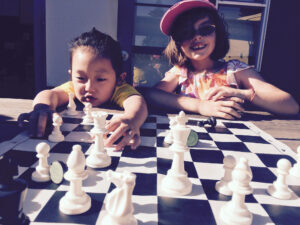SEL Tip: Responding to “I Can’t Do It.”

Your child is in the driveway practicing free throws, but very few balls make it into the hoop. As the time ticks by, you start to see the look of defeat on your child’s face. Eventually, they trudge back to the house, and say that old, familiar phrase. Here’s our advice for responding to “I can’t do it.”
What can you do? Help your child move past “I can’t do it” with these three steps:
Help your child break down the task into small steps.
It could be that your child doesn’t have some of the prerequisite skills they need to master the skill they are currently working on. Have them think through the smaller skills they need to master before working on the larger skill. Mastery happens when we deliberately practice tasks that are slightly outside of our current ability zone. Help your child make sure they are working on a skill that offers the appropriate level of challenge.
Prompt your child to reflect on what they’ve just tried and then make a small change to what they are doing.
We don’t typically improve at a task simply by trying over and over again. We have to reflect on our attempts and make small changes, until we reach our desired result. After an attempt, have your child reflect on exactly what they did, what the result was, and a small change they could make to move them closer to their desired result. For physical activities, videos can be helpful. For academics, study journals can help a lot.
Help your child seek advice.
If your child has tried tips #1 and #2, and still isn’t improving, it might be time to find a coach, teacher, or mentor with more experience and can provide specific feedback. Practice is most effective when we receive immediate, specific feedback, followed by time to attempt incorporate it.
If you want to learn more about practice habits that lead to expertise, we recommend checking out Anders Ericsson’s work around deliberate practice.
Have fun moving from “I can’t do it” to “I just did!”
If you found this content helpful, you might enjoy this Imagineerz blog post and check out Student Motivation and Social-Emotional Learning Present Challenges. Here’s How to Help!


